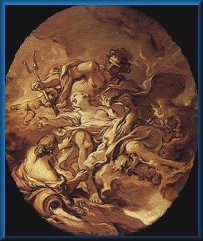
Underworld page
ancient polytheism:
Egyptian Overview
Norse Overview
War Deities
Underworld Deities
 Hades of the Greek pantheon was the third brother of the Zeus-Poseidon-Hades trio. Drawing the worst lot after Zeus overthrew Cronus, Hades was left with the underworld as his domain, while his brother Zeus got the sky and Poseidon got the sea. Frustrated at his loss, Hades accepted his fate with an iron fist.
Hades of the Greek pantheon was the third brother of the Zeus-Poseidon-Hades trio. Drawing the worst lot after Zeus overthrew Cronus, Hades was left with the underworld as his domain, while his brother Zeus got the sky and Poseidon got the sea. Frustrated at his loss, Hades accepted his fate with an iron fist.The Greeks feared death, as apparent in their mythology surrounding Hades. Hades was portrayed as an angry, greedy deity. He always wanted to increase his own wealth and gain a larger number of subjects. Because he wanted more subjects (the deceased were all under his rule), Hades favored those whose professions in life involved killing, such as assassins, fighters, and lunatics, since such occupations increased the number of dead people.
Hades' greedy characteristic was also regionally influenced. The land of the Greeks was rich in precious metals and gemstones. Thus, as his realm was deep underground, where the richest valuable resources were available, Hades was made a greedy god who adored wealth and riches almost as much as he loved having more subjects.
While a pitiless and terrible god, Hades was not a fickle one. He was an intelligent god who made wise decisions and stuck with them--in a sense, he was a fair god. He did not punish irrationally, though his punishments in general were greater than one would expect from a kinder deity, as he was a cruel god.
Notably, Hades was not the god of death, but was rather only the god of the underworld. There was a whole separate god of death, Thanatos, so one could understand why the Greeks portrayed Hades as vindictive and angry; robbed of the best realms, and not even given the power of death, all he could do was rule over the dead and covet his wealth. One almost feels pity for the sad figure of Hades, stuck with the underworld as his realm, with no true power, having to resort to a piece of armor--a helmet of invincibility--to at least control power over his own death. Hades was so desperate for underlings to compensate for his loss of true godlike power that he never let anyone in the underworld leave.

Greek

Egyptian

Norse